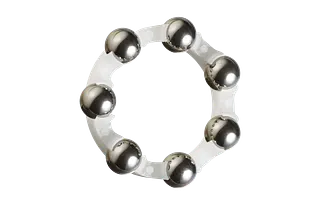Change Language :
Materials for ball bearing balls
The material for rolling bearing ball bearing balls varies widely and is always primarily oriented on the ring materials. This ensures that the interplay of cage, inner ring, and outer ring in the system is harmonised. This is especially important when the application involves heating or cooling the bearings. It is important that ball bearing running properties are always good. The most common ball materials are listed below with relation to the race material.
Balls for metallic ball bearings
Rolling bearing steel 1.3505 / 100Cr6
Hardened steel balls are often used for these ball bearings. The most common material is chrome steel with a carbon content of around 1% and a chrome content of 1.5%. Due to their specifications, steel balls made of martensitic chrome steel are particularly suitable for the production of ball bearings, as they are characterised as strong components with resistance and impressive durability in continuous use. Balls made from rolling bearing steel are robust and durable. Their susceptibility to corrosion is rather low, which is why cylindrical and needle rollers are also made from this material. However, lubrication is essential.

Balls for plastic ball bearings
Stainless steel 1.4401 and 14401 (SS316L)
Unhardened stainless steel (NIRO) balls are most commonly used for plastic ball bearings. They have excellent corrosion resistance and are also highly resistant to salt water, alkalis and bases. The use of hardened balls is not necessary for plastic ball bearings because the maximum permissible load is already restricted by the material limits of the plastic races. Stainless steel balls are more cost-effective than glass balls.
Soda-lime glass
Glass balls are used when users require a metal-free ball bearing or a ball bearing with increased chemical resistance requirements. Soda-lime glass is a mass-produced glass which, in addition to being used as a material for ball bearing balls, is also used in the manufacture of bottles, drinking glasses and flat glass. It has good chemical specifications, which makes it ideal for ball bearings that generally have to withstand short-term chemical stress and are not subjected to high thermal loads. Due to its slightly greenish colour, this type is known as lemonglass.
Borosilicate glass
This type of glass is significantly more expensive than soda-lime glass. Compared to soda-lime glass, borosilicate glass has an even higher chemical resistance, which means that it is used in applications involving strong acids. This type is crystal clear and transparent.
Further advantages:
- Very high heat and thermal shock resistance
- Mechanical strength
- Low coefficient of linear expansion
Balls for ceramic ball bearings
Aluminium oxide Al2O3
Ceramic balls made of aluminium oxide, also known as oxide ceramics, have a polycrystalline structure. The lightweight balls have specifications such as good corrosion, abrasion and heat resistance. Despite exposure to influences such as water, salt solutions and some acids, they are extremely corrosion-free. Care must be taken to avoid contact with hydrofluoric acid, hydrochloric acid, warm sulphuric acid and strong alkaline solutions. They are also known as electrical insulators and self-lubricating. The balls made of aluminium oxide Al2O3 are white to ivory in colour and are manufactured in accordance with the ASTM F 2094 Class II/III standard.
Silicon nitride Si3N4
Balls made of the ceramic material silicon nitride are lightweight but offer high toughness and excellent corrosion resistance. Corrosion only occurs in certain acidic and alkaline solutions. The material has an insulating effect. In addition, the balls are self-lubricating and have excellent resistance to temperature fluctuations, which is reflected in the bottom line price. Compared to balls made of aluminium oxide, they are significantly more expensive. The Si3N4 balls are black-pearl coloured.
Zirconium oxide ZrO2
Balls made of zirconium oxide are particularly suitable in application environments where high temperatures, corrosion and abrasion play a role. They are significantly lighter than aluminium oxide balls.
Further advantages:
- Very low porosity of the material
- High hardness of the balls
- Very good thermal, chemical and mechanical resistance
Consulting
I look forward to answering your questions
Hennlich, d.o.o.+386 4 532 06 15Write e-mail
Shipping and consultation
In person:
Monday to Friday from 7 am - 8 pm.
Saturdays from 8 am- 12 pm.
Online:
24h
WhatsApp-Service:
Montag – Freitag: 8 – 16 Uhr